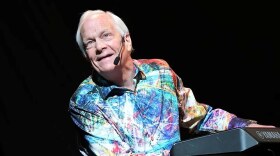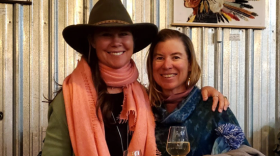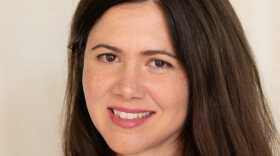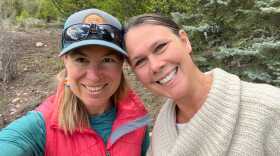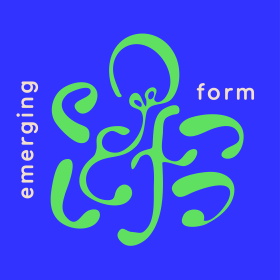
Emerging Form
Tuesday @ 6:30PM
Emerging Form is a podcast about creative process. It’s a conversation between friends — science writer Christie Aschwanden and poet Rosemerry Wahtola Trommer — in which we discuss the joys, the agonies and the black holes of our creative endeavors. Each episode, we discuss issues and questions that plague creative people. Season 1 tackles question like: How can I get useful feedback? What’s the best way to counteract existential angst? How do I know when a project is finished? Can hard work overcome mediocre talent? How do I push through when I’m stuck? When should I call it quits on a project and when should I push through? How do I build a creative habit?
Latest Episodes
-
Imagine you’ve just heard an hour-long keynote full of history, statistics, personal story and social justice. And then someone comes to the stage, sits at the piano, and sings back a song that encapsulates the emotional and intellectual content you’ve just heard. That is the improvisational talent of Ken Medema, a keyboardist/pianist, singer, storyteller and performer. In this episode of Emerging Form, we speak with Ken about the importance of a “fence” when it comes to creative play, how to listen for key phrases, how to make people feel truly seen and heard through creative response, plus there’s a spontaneous mid-interview performance!
-
“I was acutely aware of not feeling part of the club,” says Alia Hanna Habib, now a leading literary agent. “As I started to become an insider, I saw other people feel that same way.” In this episode Habib talks about writing her book, Take It From Me: An Agent’s Guide to Building a Nonfiction Writing Career from Scratch, and offers ideas for where to start writing your book, how having talented friends might both inspire and intimidate you, how to choose a topic, and why she now finds ways–with her book and her work–to open the door for other creatives.
-
“The least dangerous humor is to make fun of yourself and your foibles,” says comedian Chris Duffy. How might such a sense of humor help jumpstart and nourish your creative life? In this episode of Emerging Form, we talk with Chris about
-
It’s the sixth annual epiphany episode! Join Rosemerry and Christie as we look back on the highs and lows of their own creative practices in 2025, and reflect on the intentions we set a year ago. Did Christie “Create the Space?” How did Rosemerry explore “Spaciousness?” What did we learn about failure? About collaboration? Join us for laughter and teasing and good old-fashioned vulnerability.
-
“I had to reassess how I approached creativity and life in general,” says author Todd Mitchell. In this episode of Emerging Form, we speak with the award-winning author about how to re-envision our creative practice, how to re-think our definition of success and what makes a creative practice sustainable. We also talk about why jelly beans might be an essential item in any creative’s toolbox, habits that help us return to the page another day, and practices that help us identify where our ego is getting in the way.
-
“There are enough talented people out there,” says Julia Belluz, “but only collaborate with people you really like.” This was the advice the writer followed when deciding to work with scientist Kevin Hall on their new book, Food Intelligence. The resulting book weaves his narrative and evolution as a scientist with her narrative as a patient and journalist. In this episode, we explore what makes a successful collaboration, how to define roles—and why to do this right up front, the importance of trust, and how to communicate throughout the process.
-
“I’m a striver,” poet Alison Luterman, “still striving to grow.” In this interview with the beloved poet, we follow up on our conversation from episode 64 “It’s Okay to Not Feel Talented, Keep Going Anyway,
-
How do we take care of our creative selves? How do we step off the wheel of production and find ourselves in the wide-open moment with room to wonder and wander? In this episode, hosts Rosemerry Wahtola Trommer and Christie Aschwanden have a conversation about where they are at now in their well-filling cycle, the importance of creative self-care and the consequences of not doing so.
-
Everyone has creative genius, says Diana Hill, PhD, and in her new book, Wise Effort: How to Focus Your Genius Energy on What Matters Most, she explores how to best explore and nurture that genius. We speak about how she battled some of her own demons while writing the book–the committee arguing in her head. We talk about wise effort–not trying too hard, and the three main practices that fuel wise effort–getting curious, opening and focusing. It’s a practical, vulnerable, lighthearted episode.
-
“The first draft is absolute torture,” says historical nonfiction writer David Baron. And yet, he persists and his newest book, The Martians: The True Story of an Alien Craze that Captured Turn-of-the-Century America has garnered rave reviews from The New York Times, Wall Street Journal, The New Yorker and more. The Christian Science Monitor says, “The Martians is a fascinating tale that’s beautifully told.” We speak with Baron about the joys of research, the agony of writing, the delight in rewriting, how imagination cuts both ways, and how Truman Capote’s work has influenced his own.


